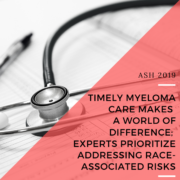Who Is on Your MPN Healthcare Team?
Who is on Your MPN Healthcare Team? from Patient Empowerment Network on Vimeo.
Who are the key members of the myeloproliferative neoplasm (MPN) healthcare team? Dr. Naveen Pemmaraju discusses the team members he recommends in the modern era for optimal care for patients with polycythemia vera (PV), essential thrombocythemia (ET), and myelofibrosis (MF).
Dr. Naveen Pemmaraju is Director of the Blastic Plasmacytoid Dendritic Cell Neoplasm (BPDCN) Program in the Department of Leukemia at The University of Texas MD Anderson Cancer Center. Learn more about Dr. Pemmaraju, here.
Related Programs:

|

|

|
Transcript:
Katherine Banwell:
When a person is diagnosed with an MPN, they have a whole healthcare team. Who is typically on that team?
Dr. Pemmaraju:
Well, it’s interesting. Yeah, that’s evolved over time.
It used to just be patient and their local oncologist, right? And the oncologist office has become a very busy place with mostly solid tumors. So, breast, prostate, colon, and then maybe a few scattered patients in most practices with blood cancers. Obviously, blood abnormalities are common with platelets and anemia and all that, but to actually have an MPN patient in the general hem/onc practice is actually quite rare. Right? These diseases are 4 to 5 out of 100,000 people.
Now, fast forward to the modern era. I think this is important. I think now, what I personally encourage – and obviously I’m biased because I’m here at the academic center. But I really think that patients with rare blood cancers such as MPNs should be co-managed. So, be seen by your local hematologist/oncologist, for sure. They know you the best. But also have a referral, if you’re able to and have the resources and ability to travel, to an academic center where you can see a blood cancer specialist such as me or my colleagues, as I only focus on blood cancer.
So, I’m not seeing patients with a solid tumor. So, local oncologist. If you can have a blood cancer expert as part of your care, it doesn’t have to replace the care. And then to have a member of the nursing allied professions – nursing and APP, advanced practice providers – is really becoming essential to help with acquiring the prescriptions from the specialty pharmacy, prior authorizations, teaching of the injectables, such as Interferon, figuring out enrolling on clinical trials.
So – and then, if a patient, young and fit, with myelofibrosis, you’ll want to be consulted with a stem cell transplant doctor. And then, finally, as if that wasn’t enough, I think a good pharmacist team is important nowadays to go over the drug-to-drug interactions, side effects. It’s not just about the JAK inhibitors but all the other medicines – antibiotics and everything else – that may be a bit unique to the MPN patient compared to the general cancer patient.










